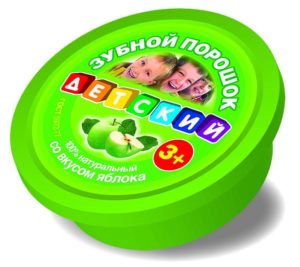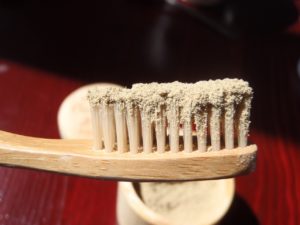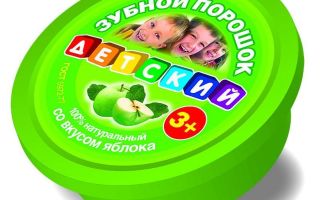Content
- 1 What is Tooth Powder
- 2 Types of Tooth Powders
- 3 Tooth powder composition
- 4 How tooth powder works
- 5 Which is better: tooth powder or toothpaste
- 6 How to use tooth powder
- 7 Tooth powder for face
- 8 The harm of tooth powder
- 9 How to make tooth powder at home
- 10 How to store tooth powder
- 11 Conclusion
- 12 Reviews
Tooth powder is a traditional oral hygiene product known for decades. Since the beginning of the production of toothpaste, it was undeservedly forgotten, although it has undeniable advantages. A useful product can be made at home as the safest oral care product. Let's try to figure out what are the benefits and harms of tooth powder.
What is Tooth Powder
The finished tooth powder is a microheterogeneous system with a particle size in the range of 10-5 – 10-3 see Produced in plastic containers of various sizes and shapes.
Types of Tooth Powders
The type of cleaning agent is influenced by the age of the consumer, the direction of use and the preferences associated with a particular scent.
The most common types of product are:
- with cinnamon and ginger;
- mint;
- with nutmeg;
- children's;
- special;
- family;
- bleaching.
Tooth powder, due to the good abrasive action of its constituent components, can be used for cleaning and whitening teeth; softening components are additionally included in the infant formula.
Tooth powder composition
In addition to the main component - calcium carbonate, clay, sodium carbonate or aluminum chloride, flavors and other related substances are added to the product. For example, sea salt - actively fights bacteria and accelerates tissue regeneration. Dry crushed herbs, eliminate bleeding, disinfect, refresh the oral cavity, relieve inflammation of the gums. Essential oils of mint, eucalyptus, for example, act as antiseptics. It copes well with bacteria and eliminates bad breath - cinnamon. Tooth powder for children has a finer crystalline structure. This composition more carefully cleans the thin enamel of children's teeth.
How tooth powder works
Unlike a paste, the abrasive particles of the cleaning compound are coarser, with sharp edges resembling crystals. When exposed to teeth, the particles remove plaque and eliminate bacteria. Beneficial components penetrate through the pores into the enamel and strengthen the inner part of the tooth.
Which is better: tooth powder or toothpaste
Any paste contains preservatives, including harmful foaming agents - sodium lauryl sulfate and its derivatives, abbreviated as SLS and SLES. They harm enamel and gums. The main advantage of a powdery product is the absence of foaming agents and preservatives. After the first application of the product, you can notice the smoothness of the enamel, which is not observed when using the paste. Small abrasive particles deal well with plaque and polish the enamel.
A powdery agent, better than a paste, has an effect:
- on the process of destruction of dental calculus;
- whitening, this is especially true for coffee, tea and cigarette lovers;
In terms of cost (it is several times cheaper than any paste). In addition to the main task of caring for the oral cavity, a hygienic product is used for cleaning silver, cupronickel, for facial care, removing stains, etc.

How to use tooth powder
Brushing your teeth with this tool is quick and easy.A small amount of the cleaning agent is applied to a damp brush. The movements when brushing your teeth should be less intense than when using a paste. After cleaning, rinse your mouth well with water.
Some features of brushing teeth using powder that you need to know about:
- it is better to use a soft bristled brush to brush your teeth so as not to damage the enamel;
- the duration of the procedure is at least 5 minutes;
- rinse the mouth for longer than using a paste; small particles are difficult to wash out with a single rinse;
- it is better to start the process with incisors and anterior teeth;

Tooth powder for face
Facial tooth powder works well as a scrub. The effectiveness of the procedure increases many times after visiting a bath or taking a bath. To cleanse the skin, apply the product to the face with light finger movements. Massage movements scrub the skin for several minutes, while excess fat, keratinized particles are removed from the skin, black dots disappear. Cleansing can be done no more than 1 time per week, especially with normal or dry skin.
A mask for blackheads on the face (acne) is prepared by mixing a whitening tooth powder with hydrogen peroxide. The gruel mixture is applied to problem areas of the face for 30-40 minutes, then gently washed off with plenty of water.
Tooth powder and table salt, when used together, are effective for hard scrubbing.
The harm of tooth powder
The high abrasiveness of the product has both positive and negative effects. Frequent use of the product may result in a thinning of the enamel. It is recommended that you brush your teeth gently and with minimal pressure. Do not use if gums are bleeding. The process can get worse.
In general, these points do not put the described product among the undesirable oral care products. It is wrong to say that tooth powder is harmful.
How to make tooth powder at home
It is easy to make tooth powder at home with your own hands.
The most common and simple recipe for making.
Composition:
- ground ginger root;
- soda;
- sea, rock or Himalayan salt.
All components will need to be taken 1 teaspoon each, mix well and the product is ready to use. Ginger, salt, and baking soda have a beneficial effect on blood vessels.
This composition has an effective effect on the gums, protects them from bleeding. It is recommended to brush your teeth with this tool no more than once or twice a week.
The composition of the herbal cleaner can be varied to suit individual preferences.
For example, the following composition is interesting and effective:
- calamus root;
- nettle;
- mint;
- chamomile;
- soda 0.5 tablespoons;
- white clay 0.5 tablespoons.
The herbs are crushed to a powder and added to the mixture. Mint will cool and give freshness to the breath, improve blood circulation; calamus has anti-inflammatory, antiseptic effect; nettle is useful for its high content of biologically active substances.
Self-made cleaning tooth powders can be used during pregnancy too. They will not harm the health of either the mother or the unborn baby.
How to store tooth powder
Store the product in a tightly closed container in a dry place. It is better to replace cardboard packaging with plastic.
Conclusion
The benefits and harms of tooth powder depend on many factors. If used correctly, a cleaning agent will only have a positive effect.The teeth will be clean and beautiful, and the smile will be charming. Nothing paints a person like a sweet, kind smile against the background of white healthy teeth.

